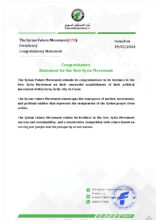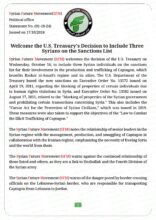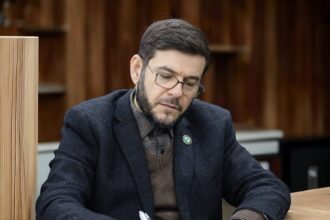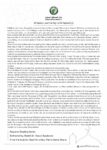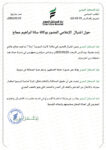The New Administration in Syria: An Analysis of the Local, Regional, and International Scene

The New Administration in Syria is seen as an opportunity to reshape the relationship between the state and its citizens on one hand, and between the state and its regional and international surroundings on the other. This transformation does not occur in isolation but reflects complex dynamics resulting from a decade of conflict and geopolitical changes.
In this article, we aim to explore how the new administration addresses these challenges on local, regional, and international levels, and whether Syria can serve as a starting point for broader political transformations in the region and the world. We also discuss the role Syrians must play in supporting the new administration and contributing to the country’s stability.
Internal Challenges: Reconstruction, transitional justice, political system reform, and rebuilding the social fabric.
The Local Reality: Challenges of National Reconstruction
On the domestic front, the new administration in Syria faces a range of fundamental challenges:
- Reconstruction and Infrastructure: The prolonged war has left devastating effects on infrastructure, including electricity networks, roads, schools, and hospitals. The priority for the new administration is to develop a comprehensive reconstruction plan in cooperation with international and regional partners.
- Transitional Justice: Genuine reconciliation cannot be achieved without addressing human rights violations. The administration must adopt a comprehensive transitional justice policy that includes accountability, reparations, and guarantees of non-recurrence.
- Economy and Resource Redistribution: The Syrian economy is suffering from multiple crises, including inflation, unemployment, and financial collapse. The new administration needs to develop economic policies that restore public trust through equitable resource allocation, combating corruption, and stimulating productive sectors.
- Political System Reform: Reforming state institutions is essential to ensure transparency and democracy in the political process. This requires drafting a constitution that aligns with the vision for the new state, updating laws, and empowering civil society.
- Rebuilding the Social Fabric: The war has caused deep fractures in relationships between Syria’s sects and communities. The administration needs comprehensive programs to promote peaceful coexistence and rebuild trust among all parties.
Regional Opportunities and Challenges: Balanced relations with neighbors, alliances, the refugee issue, and regional conflicts.
The Regional Framework: Challenges and Opportunities
Syria plays a central role in the region, and the new administration must approach regional issues with caution and realism:
- Balanced Relations with Neighbors: It is essential for the new administration to seek normalization of relations with neighboring countries such as Turkey, Jordan, and Iraq, ensuring border security and enhancing economic cooperation.
- Rebalancing Alliances: While maintaining strategic relationships with Russia and Iran, the administration might also strive to improve ties with Arab and Gulf states to reintegrate into the regional system.
- The Refugee Issue: The return of Syrian refugees is a critical file, and the administration will need to provide security and economic guarantees to encourage their return.
- Regional Conflicts: Syria’s role in conflicts such as the Palestinian cause and Yemen can be part of efforts to reposition itself within the region.
International Challenges: Reintegration into the international community, maintaining balanced relations with Russia and the U.S., and leveraging global changes.
The International Context: Engaging with Major Powers
On the international level, the new Syrian administration will face challenges and opportunities in dealing with major powers:
- Balanced Relations with Russia and the U.S.: Continued cooperation with Russia remains a priority due to its military and political support. However, the administration might also seek to open channels of communication with the West to improve relations and lift sanctions.
- Reintegration into the International Community: Syria needs diplomatic initiatives to rebuild its international image, which requires a commitment to political and economic reforms and respect for human rights.
- Leveraging Global Changes: The competition between major powers, such as China and the United States, could present opportunities for Syria to benefit from investments or new alliances.
The Role of Syrians in Supporting the New Administration
The success of the new administration in Syria largely depends on the cooperation of the Syrian people, both inside the country and abroad. Citizens are the primary partners in building a stable and prosperous future. This requires an active and comprehensive role in various political, social, and economic fields. Below are the key roles expected of Syrians to support the new administration:
- Participation in the Political Process: Engaging in the political process is one of the most important ways to support the new administration. Syrians should actively participate in local and national elections, whether by voting or running for office, to strengthen democracy and ensure the representation of all segments of society. Citizens should also support initiatives aimed at political reform, including constitutional review and enhancing the role of legislative and judicial institutions.
- Supporting Syrians for the new administration is not just a national duty but an essential condition for achieving stability and prosperity.
- Promoting National Reconciliation: One of the key challenges facing the new administration is rebuilding the social fabric torn apart by years of war. Syrians can support these efforts by rejecting hatred, sectarian, and ethnic divisions and fostering a culture of tolerance and coexistence. Participating in national reconciliation programs and contributing to dialogue among different communities are essential steps toward achieving peace and stability.
- Contributing to Reconstruction: Rebuilding Syria requires collective efforts and substantial investments. Syrians, especially expatriates, have a vital role to play. Citizens can contribute by investing in vital sectors such as agriculture, industry, and infrastructure. Additionally, supporting local initiatives aimed at improving essential services like education and healthcare is crucial.
- Supporting the National Economy: The economic challenges facing Syria call for revitalizing the national economy through small and medium-sized enterprises, promoting local industries, and developing the agricultural sector, one of the most critical productive fields. Expatriates can also channel their savings into domestic investments, strengthening the local currency.
- Supporting Diplomatic Efforts: Syrians abroad play a significant role in improving the country’s image internationally. They can engage with governments and communities where they reside to build support for Syria and help lift imposed sanctions. Participating in international conferences and media efforts to clarify Syrian aspirations and foster global partnerships for reconstruction is equally vital.
- Oversight and Accountability: Syrians should take part in monitoring the performance of the new administration to ensure its commitment to necessary reforms. Civil society and activists can enhance transparency by tracking the implementation of government policies and providing constructive feedback to improve overall performance.
- Enhancing Education and Culture: Raising awareness and nurturing a new generation that embraces values of tolerance and citizenship is a priority. Syrians can support education by volunteering for or funding educational initiatives and fostering a culture of human rights and dialogue.
Supporting the New Administration The support of Syrians for the new administration is not merely a national duty but a fundamental requirement for achieving stability and prosperity. The new administration in Syria represents a genuine opportunity to build a strong and balanced state, both internally and externally. The success of this project depends on the vision of the new leadership, the support of the Syrian people, and smart engagement with regional and international changes. Syria, with its history and geopolitical position, has the potential to be the starting point for broader political transformations. However, this requires a genuine will for change and honest national and international partnerships.
Political Office
Dr. Kamal Aslan
Research and Studies Department
Independent Researchers
Syrian Future Movement
